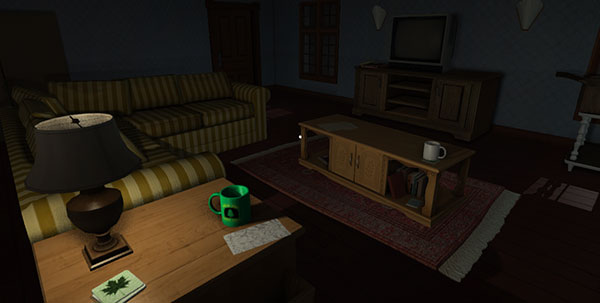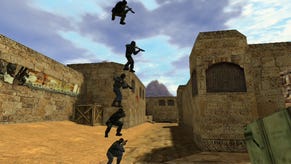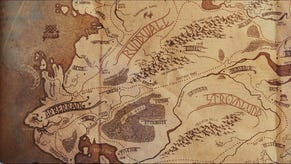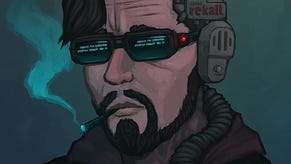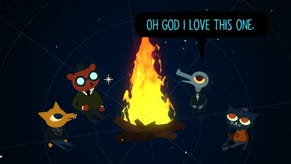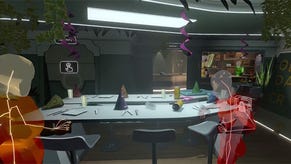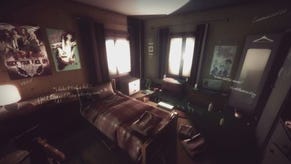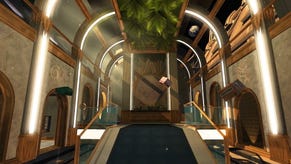Ain't No Mystery: Fullbright Talks Gone Home
First-person observer
Gone Home is to be the first game from The Fullbright Company, a new indie studio whose formerly mainstream members were previously the prime creators of the excellent BioShock 2 add-on Minerva's Den, as well as working on assorted other 2K projects. I had a chat with Mr Fullbright himself, Steve Gaynor, about their highly intriguing but equally mysterious non-combat first-person game. Why ditch the guns? Why leave cushty industry jobs to do this? How abstract will it be? How much can the physics be abused? I also made some sweeping generalisations about Columbo.
RPS: Did you guys know Gone Home was what you were ultimately going to do when you made this plan to go off and make your own studio?
SG: The original idea was a little bit more abstract and a little bit more complicated, but I started from the point of a first person exploration game that takes place in a single location like a house or a large manor or something. There was a more complicated version that had basically a hacking cyberspace flavour to it. It was a lot more sci fi, sort of this home of the future thing, and that was the original idea that I pitched to Johnnemann [Nordhagen] and Karla [Zimonja].
They were interested and then we kept talking about other possibilities, and basically boiled it down to what Gone Home is, which is all about exploration and investigation and finding what happened in this house that you’re exploring. Basically we cut out all the stuff that felt extraneous or less directly tied to the core experience of being in this place. We started talking about the ideas very early in the year, in January or so, and this was while we were still making plans - I’d already left Irrational, but this was while Johnnemann and Karla were still making arrangements to leave 2K Marin. By the time that everything was settled and Karla and Johnnemann had actually moved and were on site and we were all working in the same place, we could basically go straight into production mode on it, because by that point we knew what the game was supposed to be.
RPS: Were you the ringleader then, having left first, were you nagging at these guys saying ‘You’ve got to leave, you’ve got to come and join me’? Or had you all come to the same conclusion already?
SG: It was one of these things where I was trying to figure out what I was going to do, and my wife and I knew that we wanted to get back to the West coast because it’s where she grew up and we both think of it as our home. We just wanted to be back here. From my end I was like ‘if we want to be in Portland Oregon, which we do, how am I going to do that?’ because there isn’t a triple A games industry here. And so the two options were either to figure out how to do a lot of remote contract work, which can be tough for the kind of stuff that I do, or start my own thing.
So it was like ‘alright, I’ve made this decision to come back to the West coast, if I were back there, would you guys be interested in working with me?’ And that’s when discussions started. I don’t take it lightly, it’s a big deal that a couple of people left their jobs and uprooted their lives to come work on this thing, but we discussed it for a while and ended up deciding it made sense to make this idea a reality.
RPS: You’ve got to be an inspirational Spartacus figure to be like ‘come, join me, throw your fortunes to the wind, everything will be OK!’ That’s pretty persuasive.
SG: I don’t know if you were bugging the room at the time, that was exactly what I said (laughs). It’s the kind of thing where we had worked together before and I had been the lead on a project that we had all worked on together. We wanted to have that small team experience again, because it was a really great experience being a small team on Minerva’s Den within a large organisation. We wanted to do something that we could really own, which you don’t often get an opportunity for in the corporate games world.
RPS: So coming up with the idea to make it entirely non-combat, was it this hard line philosophy of ‘we will be the pacifist game’?
SG: It’s equally a philosophical and practical decision. We’ve all worked on these shooter games and that stuff is obviously fun and there’s a ton of great games that do well on it, but also it’s not super exciting to us conceptually, as far as design and implementation goes. The other side of it is we’re a very small team, we’re three people full time and we’re working with some outside people to get more content into the game, but making combat requires a huge amount of time and energy and resources to be competitive. Between those two things we wanted to do something different, that isn’t like games we’ve already played and isn’t just part of an established genre that you immediately are familiar with.
It sort of made sense to say ‘well if there’s no shooting, there’s no enemies, there’s no spells or attacks or whatever, but you’re still in a first person perspective exploring a place, what then is that core experience if there’s no combat?' So that’s been the hard problem that we’ve been working on solving. We had a plan from the beginning of what the centre of the experience was going to be, and we’ve been building that out, and it seems like it’s working out the way we were hoping. There’s a lot of work left to do but we’re confident that now that we can actually see the ideas on screen that they’re still worth pursuing.
RPS: Pacing must be quite a big issue because even though presumably it’s going to be a bit ambient and pacifistic, there’s going to be a need to keep people excited and engaged, and the go-to way for decades has generally been ‘throw a fight in’. Even like Superbrothers: Sword & Sworcery, they throw in some boss fights amongst the puzzling to keep it up. Did you ever hit stuff where it seems like ‘oh, this is too ambient, and people are going to drift away so we need to do some big set piece puzzle or something to stop them feeling too disconnected?’
SG: Even puzzles are that. Puzzles and combat, experientially they’re very different, but functionally they will serve the same purpose which is to test the player and slow them down like you said, and engage them with something very mechanical, and basically make them prove that they’re paying enough attention to keep playing. It’s kind of like ‘alright, you’ve been walking around enough, here’s some dudes. Just let us know the minute you are actually engaging with this thing, shoot these dudes. Ok alright, you’re done with that, you can keep going.’
It’s fun, it’s interesting to see how this stuff externalises itself because the first big splash of these non-combat first person games that are being worked on was obviously Portal, and it’s a game all about test chambers. It’s like ‘test the player, make them prove they’re good enough to play the designer’s game.’ So anyway, that philosophically is not super interesting to me. Understanding that there is joy to engaging with and overcoming a challenge that’s been implemented by a designer, that’s obviously true, but that said our goal is to say ‘listen, here is this experience that is inherently interesting.' The game is based on our interest in urban exploration. In real life people will make a hobby out of finding abandoned places and going to them and digging around and finding out what happened here, who lived here and what the history of the place is by exploring it.
RPS: It’s kind of like a Columbo simulator. He just goes into people’s houses and looks through their stuff.
SG: I thought Columbo spent more time having a rumpled trenchcoat and asking questions. Did he do a lot of rummaging through people’s underwear drawers?
RPS: Pretty much whenever they look away he’s going through their drawers and stuff and finding clues which he pockets silently and brings up later. He’s good at it.
SG: Was he a police detective or was he a private detective?
RPS: He was a police detective, but he bent the law to his own ends for the greater good. Or at least because it was funny.
SG: That’s just illegal if you don’t have a warrant (laughs). But nobody would suspect Columbo. So yeah, this is an experience that in real life you can actually undertake, which is going to an abandoned place and trying to piece together what happened here. From our point of view, pacing is definitely a concern, because you do need to provide enough interesting content that people want to actually take their time and explore every space and find everything that’s in it, without it either being too empty, and so people just breeze through it and assume that there’s nothing to it, or being too overloaded with pointless stuff that you get fatigued.
It’s a definite balancing act in terms of ‘how do we pace this game well so that people are just pulled on by the desire to keep exploring?’ But we have a fiction and a set of mechanics that basically says we can’t get lazy and fall back on ‘alright, now there’s a bad guy’ or ‘y’know what, maybe there was this crazy puzzle for some reason in this totally normal place.’ So we’re basically forced to figure out how to make the thing that we’ve decided to make engaging, and not turn it into some other kind of thing.
RPS: How far into the game do you think it will be until people know everything they need to know in terms of how to control it and interact with it?
SG: I hope not very long. My interest is saying to the player: ‘here’s what you can do in the world, and the kind of ways that this reacts’. We don’t have a huge verb set - you can interact with stuff, you can move around, you can collect things, you can crouch so that you can see under things... Hopefully within the first couple of rooms you know the extent of your capabilities, but what the player’s able to do and what the designer is able to place into the game is malleable and broad enough that the player is constantly surprised or interested by what they encounter using that simple set of interactions, as opposed to having to memorise a dozen buttons better. ‘Oh, what’s the switch weapon button?’ or whatever. Obviously we don’t have that.
RPS: You should have that anyway – you can switch weapons but you can’t use them. Equip a gun or a knife for no real purpose.
SG: Something about triple A games that I don’t know if it’s a good thing, working on console shooters for years, there’s a dozen buttons, including clicking the thumb stick and everything, and you run out of them. It’s like: what the hell are we doing? ‘Oh, we don’t have anywhere to put the twentieth thing that you can do’. And so in Gone Home I’m much more interested in a simple set of core interactions that give rise to a highly varied suite of experiences that you can have within this place, just based on using those core interactions to interact with different kinds of things, and to discover the combinations of interactive set-ups that you weren’t expecting from the outset.
It’s kind of on us as the designers to keep surprising the player, but on the other hand mental stimulation is really important, and I think that there’s going to be a fair amount of the player also just amusing themselves. The point of a game is for the world to be full of stuff that the player finds interesting, whether it’s little story bits like ‘oh, I found this little note, and I read it, and now I understand more about the game world’ or if you watch the video, when you open up a drawer there are these physics objects that roll around and move. From seeing how people played with Skyrim, when they're like "I’m going to go and gather up every melon in the world…"
RPS: I’m going to get all the apples, all the apples will be mine…
SG: Exactly. So I think that something that’s going to be really important about our game, that is going to make it feel more rich and real than if it was just a bunch of static content that you walked around and clicked on and read, is having all these physical objects that represent what the house is full of. Just the stuff that lives in it - allowing you to pick it up and move it around and say, if you want to go around and find every single stuffed animal that lives in the house and bring them back to the living room and pile them up on the couch, you can do that. It’s part of the reason that when I captured the video, there’s this moment in it when you have to move that little duck statue so you can get a key…
RPS: The Christmas duck, right?
SG: The Christmas duck… who’s in storage. You have to move the Christmas duck to get a key. But then before I went and opened the door I’m like ‘you know what, I’m going to take this Christmas duck and put him in a drawer and close the drawer.’ I think it was just something satisfying about being able to say ‘I’m going to rearrange this world, and organise it in the way I want, and see what happens if I put this inside of this, or this on top of this.' Because I think it would just feel like a dead world if the player didn’t have these physically simulated things that they could say ‘alright, it would be funny if I put this one object on top of another one' and then 'Ok, alright, I’m done with that, I’m going to go back to continuing along the storyline.’
RPS: Presumably the mucking about stuff isn’t going to alter the way the game plays out, it’s just for the player’s indulgence sake?
SG: Yeah, we aren’t going to make it so that you take something that’s critical to completing the game, and like throw it in the toilet and not be able to get it anymore (laughs). There’s something that I found really interesting actually when I was replaying Deus Ex 1, before Human Revolution came out, I noticed something really smart that they did. You know data cubes, how they have critical information on them? If you want to have a key code to a thing because you’re the sneaky player, you need to interact with a data cube. And something I thought was interesting was the first time you click on a data cube, it displays the text and automatically puts that text into your journal or whatever, so it’s guaranteed if you’ve ever interacted with a data cube you have the information available to you. And then if you click on it again while the text screen overlay is open, you pick up the data cube and you can carry it around or throw it in the ocean.
RPS: Aaah, I didn’t know that.
SG: Exactly, who does know that? But you can. And they allowed it because they thought it was important to say this data cube isn’t nailed down, but we’re not just going to let you throw this critical information down a sewer. So that’s part of that design challenge that I was describing before, which is that you just have to figure out how to ride that line between making the world as consistent and interactive as you can without allowing the player to shoot themselves in the foot in a way that’s just never going to be enjoyable to them. If you could just pick up a data cube and drop it somewhere and now you don’t have the key code, then you never knew that information was on there. It’s not just a bad experience, it’s one that you don’t even realise that you’re having, because it’s invisible information.
RPS: And you’ve probably got to cater to the guys who will actively try to break the game - like in Deus Ex, there’s probably someone who’s got a room full of all the data cubes, they’ve just piled them up to see what happens. Can you even test for all these eventualities with a physics-y game like yours?
SG: I think it is as you say, just because of how we’re setting up the interactive language of our game, you will never be able to directly impact the course of events by collecting every single book in the game and tossing it somewhere. I guess the biggest challenge at that point for us is mostly going to be a performance thing, like ‘what if you do have every physics object in the entire game stacked up on top of each other?’ But on some level you have to try that and see what happens, and then do the trade off of ‘is anyone else ever actually going to do this, and if they do and it breaks the game, is that fine?’ Because they’re obviously trying pretty hard (laughs). So maybe it’s fine if just the game goes to shit at the point that they’ve spent hours gathering up every physics object and stacking it on top of every other one.
Next time - I shout a long list of other game names because it seemed like a good idea at the time, and to his eternal credit Steve responds with how his game does or doesn't compare to them.



